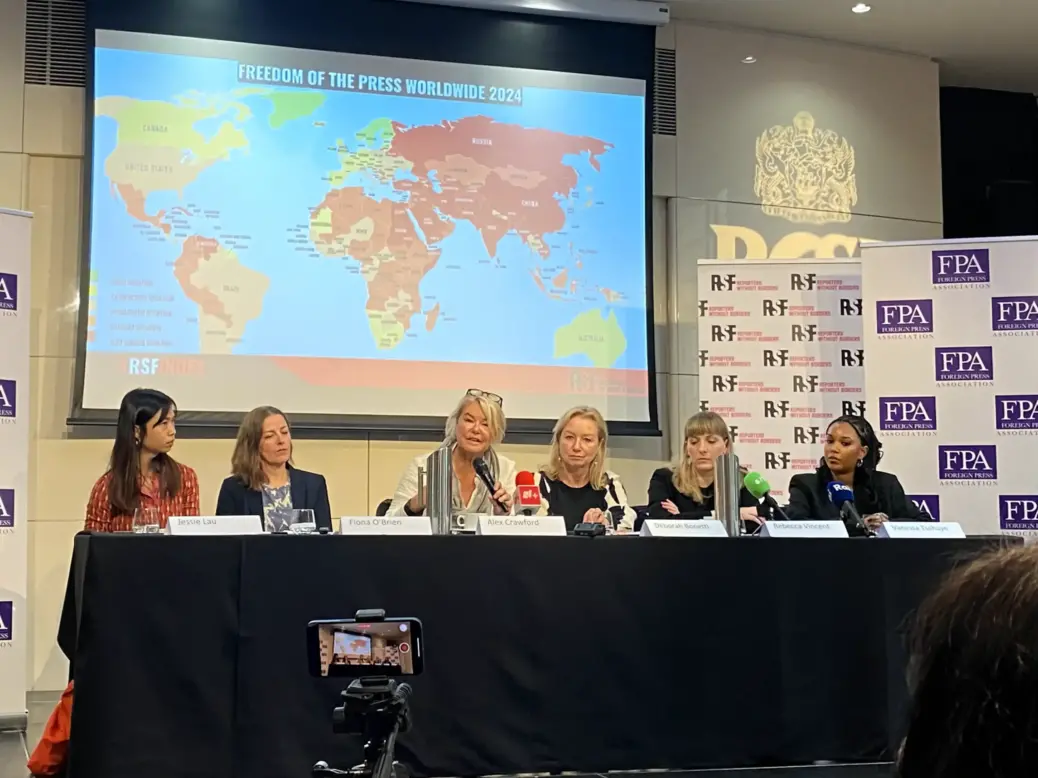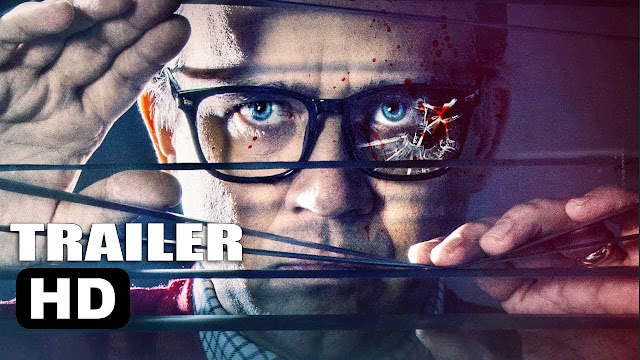
Sky News special correspondent Alex Crawford has said press freedom speeches given by the Prime Minister and Culture Secretary this week amounted to “empty words” in light of the ongoing Israeli ban on journalists entering Gaza.
Crawford, who in February organised an open letter from 55 foreign correspondents pleading for the Israeli government to allow some international journalists into Gaza, said “there is no freedom of information” when reporters cannot get on the ground.
Crawford was speaking on Friday as part of a launch event for the 2024 World Press Freedom Index produced by Reporters Without Borders (RSF).
[Read more: RSF Press Freedom Index 2024 — UK and US scores hit by widespread job cuts]
Alex Crawford: ‘There is no political pressure from key allies of Israel to try and get foreign journalists in’
On Tuesday Prime Minister Rishi Sunak told the Society of Editors conference that the UK Government is “acting to protect a free press” because “it strengthens democracy and enriches society”.
In a speech later the same day Culture Secretary Lucy Frazer said the Conservatives would “always ensure that the press is free to speak the truth”.
But Crawford, who was also at the Tuesday event, dismissed the remarks.
“Listening to Rishi Sunak and the Culture Secretary doing stirring speeches about how they’re defending media freedom, [how] we’re so important as journalists… those are empty words without any action. They’re really empty.
“There is no question of defending media freedom where the most current, obvious, live-streamed war going on shows an absolutely complete and utter disregard for journalists — complete and utter disregard for the whole aspect of freedom of information.”
She added: “We should be really worried about the lack of access to Gaza right now… There is no political pressure from key allies of Israel to try and get foreign journalists in.”
Crawford questioned whether Foreign Secretary David Cameron had “mentioned how there is a lack of foreign access” to Gaza during diplomatic trips to Israel, and said a lack of apparent pressure “seems really shocking and appalling and very hypocritical”.
“You can’t be complaining about other countries, as [the Government] do very, very regularly… for not being honest with the media — but then be part of this system which is keeping everyone out.”
Crawford argued that allowing journalists to embed with the Israeli military was insufficient.
“The idea that embedding with the Israeli military is somehow enough really doesn’t seem to understand the way these embeds work. They choose who goes in and who becomes part of them…
“They decide the route, they decide where you go and they decide how long you’re there… None of the journalists who got hand-picked got to talk to anyone apart from Israeli soldiers.”
In the first few months of the war, Crawford said, “I thought ‘maybe I’m not doing enough to get inside Gaza, maybe it’s just me that’s failing.’
“And then I realised that every single other foreign correspondent in the world is also, apparently, failing. And that cannot be possible – we’re all being blocked. And that is extremely alarming because we’re not getting the right picture.”
Crawford also criticised scrutiny that has been directed toward the impartiality of Palestinian journalists, saying: “I don’t think we can rely on Palestinian journalists and then question whether they’re accurate or not… They are our colleagues that we’ve worked with a number of years.
“They’re not comfortable with being named, they’re not comfortable with being on screen because of the massive danger and risk that that puts on not just them but their children, their partners and everyone that’s connected with them.
“They ask to be anonymous, therefore we then become the faces or the voices of their work. But am I now going to question the veracity of everything they’re telling me? They’re the same people that I’ve known for 15, 20 years — so there’s no question that they’re suddenly now not going to be acting honourably as journalists.
“We all make mistakes, and we might occasionally get things wrong — more than occasionally. But that doesn’t mean that they shouldn’t be trusted as fellow journalists.”
RSF director of campaigns Rebecca Vincent added that, as well as getting journalists entry into Gaza, “there’s also still an urgent need for evacuations of journalists that are trying to get out”.
And Fiona O’Brien, the organisation’s London bureau chief, said: “The international community has shown again and again this year that it’s not willing to use international humanitarian law that already exists, press freedom laws that exist and they promised to abide by, to enforce, to protect journalists around the world.”
Approached for comment about Crawford’s remarks, a Government spokesperson said: “Both the Prime Minister and the Culture Secretary raised the plight of journalists reporting from war zones in their speeches at the Society of Editors, and praised them for their bravery.
“Reporters covering conflicts are afforded protection under international humanitarian law. Israel must ensure its campaign is targeted at Hamas leaders and operatives and ensure journalists can carry out their work safely.”
Eritrean and Hong Kong journalists on challenges reporting on some of lowest-ranked countries for press freedom
Both Israel and Palestine slid down the Press Freedom Index this year amid a broader deterioration in global freedom of expression. Political threats to press freedom drove much of the decline, RSF said.
Jessie Lau, a Hong Kong journalist based in London, told the RSF event that reporting on China (ranked 172 out of 180) had “deteriorated” significantly in recent years.
She attributed the worsening situation to factors including the advanced tracking of users on social media and an expansion in what subjects are considered sensitive to report on, for example feminism and gender, which she said were “increasingly seen as a threat” to the Chinese Communist Party.
Lau added that the Chinese government had “really ramped up its propaganda surrounding national security” so that critical reporting is often characterised as foreign espionage.
A journalist she spoke with in Beijing, Lau said, had told her “it’s so heartbreaking to be trying your best to cover a story on the ground only for your sources to be accusing you of being a foreign spy — even if you are Chinese”.
Vanessa Tsehaye, an Eritrean filmmaker also based in London, explained that her country was bottom of RSF’s list this year because there is “absolutely nothing” in the way of on the ground journalism in the country, calling it “a complete black hole when it comes to journalism”.
A group of at least 11 independent Eritrean journalists were detained without arrest in 2001, among them Swedish-Eritrean journalist Dawit Isaak, and they remain imprisoned with their whereabouts unknown. RSF describes them as “the longest-detained journalists in the world”.
“By disappearing them and by completely erasing them from the public consciousness they are succeeding in doing what they wanted to do, which is to silence them,” Tsehaye said. “What we need to do is continue speaking about them — as individuals, not just as numbers.”




